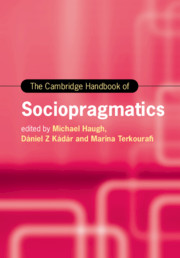Book contents
- The Cambridge Handbook of Sociopragmatics
- Cambridge Handbooks in Language and Linguistics
- The Cambridge Handbook of Sociopragmatics
- Copyright page
- Contents
- Figures
- Tables
- Contributors
- Acknowledgements
- 1 Introduction
- Part I Fundamentals of Sociopragmatics
- Part II Topics and Settings in Sociopragmatics
- 13 Face, Facework and Face-Threatening Acts
- 14 Relationships and Relating
- 15 Analysing Identity
- 16 (Im)politeness and Sociopragmatics
- 17 Affect and Emotion
- 18 Power
- 19 Morality in Sociopragmatics
- 20 Conversational Humour
- 21 Gesture and Prosody in Multimodal Communication
- 22 Digitally Mediated Communication
- 23 Workplace and Institutional Discourse
- 24 Service Encounter Discourse
- 25 Argumentative, Political and Legal Discourse
- 26 The Pragmatics of Translation
- Part III Approaches and Methods in Sociopragmatics
- Index
- References
15 - Analysing Identity
from Part II - Topics and Settings in Sociopragmatics
Published online by Cambridge University Press: 01 April 2021
- The Cambridge Handbook of Sociopragmatics
- Cambridge Handbooks in Language and Linguistics
- The Cambridge Handbook of Sociopragmatics
- Copyright page
- Contents
- Figures
- Tables
- Contributors
- Acknowledgements
- 1 Introduction
- Part I Fundamentals of Sociopragmatics
- Part II Topics and Settings in Sociopragmatics
- 13 Face, Facework and Face-Threatening Acts
- 14 Relationships and Relating
- 15 Analysing Identity
- 16 (Im)politeness and Sociopragmatics
- 17 Affect and Emotion
- 18 Power
- 19 Morality in Sociopragmatics
- 20 Conversational Humour
- 21 Gesture and Prosody in Multimodal Communication
- 22 Digitally Mediated Communication
- 23 Workplace and Institutional Discourse
- 24 Service Encounter Discourse
- 25 Argumentative, Political and Legal Discourse
- 26 The Pragmatics of Translation
- Part III Approaches and Methods in Sociopragmatics
- Index
- References
Summary
Despite the centrality of the notion of identity to human communication and within discourse studies and sociolinguistics, a critical mass of identity-related work within different sub-fields of pragmatics is still lagging behind. As a result, this chapter is partly a review of existing work and partly programmatic. We specifically argue that the notion of identity is crucial to the postulates of some of the major approaches that have constituted the bases of sociopragmatics, namely speech act and politeness theories as well as some of their most common applications, interlanguage and inter/cross-cultural pragmatics and, more recently, the pragmatics of social media. However, as these theories and their applications have developed mostly in a top-down fashion (i.e. based on categorizations and taxonomies) and as they have largely been non-discursive (utterance based) in orientation, identity has more often than not been treated as a given, as structurally pre-allocated properties rather than as co-constructed and discursively achieved.As sociopragmatics is embracing discursive and interactional perspectives on its mainstay concerns (esp. politeness), we show the need for identity construction -- always at the heart of discourse(s) -- to take centre stage along with associated processes of agency in the study of situated practices.
- Type
- Chapter
- Information
- The Cambridge Handbook of Sociopragmatics , pp. 293 - 314Publisher: Cambridge University PressPrint publication year: 2021
References
- 3
- Cited by



